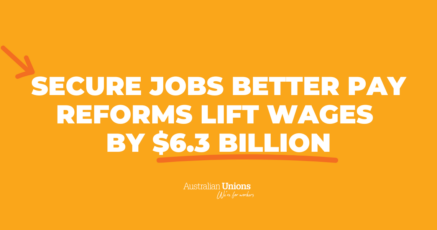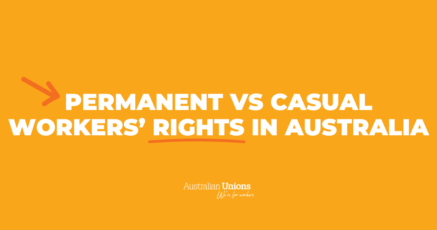For the first time this century, you will likely be heading to the polling booths with a real income lower than the last time you voted.
That’s because over the term of this Morrison government, real wages have fallen by 2.3%.
The latest Missing in Action report on Wages from the ACTU shows that this crisis in Australian wages did not happen by accident.
Wage increases needed to address cost of living crisis
When prices for everyday items such as vegetables, meat and petrol climb upwards, it’s common sense that wages need to keep up.
The latest figures showed that inflation has jumped to 2.1% for the quarter but wages have not kept pace. These new numbers mean that the average worker will now lose almost $2000 in the first half of this year, and almost $4000 over the year if current trends continue.
The Missing in Action report showed that a worker would have earned, on average, $10,000 more if real wages had kept up with productivity since the Coalition Government came to power in 2013.
But Morrison’s refusal to support necessary wage rises has meant employees like aged care worker Charlotte have been struggling to make ends meet.
“The killer is rent. It’s about $850 per fortnight for 2 bedrooms. I have to sleep in the lounge room,” she said.
“All I’m doing is paying bills, there’s nothing left over. I’m in my 40s, I have two kids in their late teens. The costs don’t just end when they turn eighteen, but the Centrelink payments do.”
Morrison missing in action on necessary policy responses
A few key ways Coalition Governments have consistently entrenched low wage growth:
-
Failing to act on wage theft
-
Promoting insecure work and the rise of underemployment
-
Pretending wages growth is just around the corner
-
Failing to act on the gender pay gap
-
Failing to advocate for real wage rises for 1 in 4 workers
We know that wages have barely grown under this government. Workers’ purchasing power has been flat for nearly a decade and is now eroding rapidly in the face of accelerating prices on essentials like fresh food, fuel, housing and childcare.
Low wages are not inevitable. A range of simple and practical measures would turn around our lost decade of wage growth and give Australians the pay rise they deserve.
But on all of these measures, Morrison is missing in action on wages.
Truck driver and Transport Workers Union delegate Jonathan understood the need for better wages when he led the TWU fight for job security in 2021.
He explained the positive changes all workers would be able to achieve if the Morrison Government were to implement the necessary policies.
A wage increase means that life gets easier, with less stress.
A wage increase means that the necessities become affordable, and people don’t need to make the decision on what’s more necessary.
A wage increase means that our wages go up, not backwards with inflation.
Jonathan
Truck driver and Transport Workers Union delegate

There’s a way you can still get a wage increase
Jonathan is just one of almost two million union members who have stepped up for workers when Morrison has gone missing.
The report stated that one bright light for wages over the past decade has been for those involved in union-negotiated enterprise bargaining agreements.
Despite Morrison Government’s attempts to undermine enterprise bargaining agreements, the report highlighted that higher wage growth has occurred through these agreements than elsewhere in the labour market.
Workers in Australian unions continue to negotiate higher pay in ways that ensure all members get a decent wage and a fair share.
You shouldn’t have to scrape by to make ends meet. Union members earn, on average, $250 more per week than non-union members.






SHARE:
The average worker could have earned thousands more if it wasn’t for Morrison